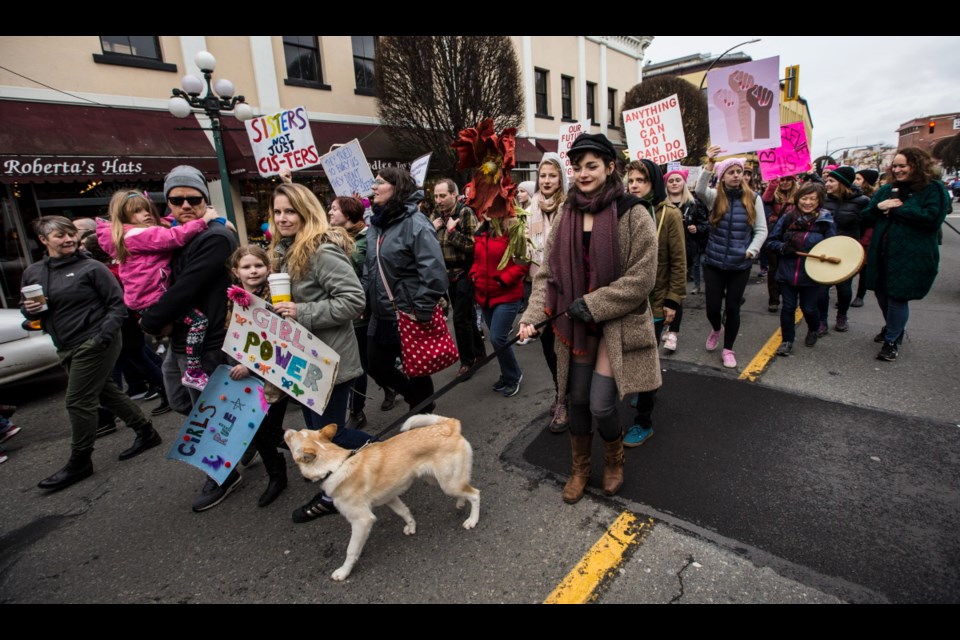Hundreds of women, children and men gathered in Centennial Square on Saturday before marching down Government Street to the legislature in support of women’s rights and equality.
Many women wore knitted pink “pussy” hats, while placards with messages such as “Grab patriarchy by the balls” and “Nevertheless she persisted” dotted the crowd.
Similar marches were held in Nanaimo, Courtenay, Salt Spring Island and in communities across Canada and around the world, the scenes reminiscent of the Women’s Marches that sprang up around the globe a year ago in the wake of Donald Trump’s inauguration as U.S. president.
Fuelled by anger over Trump’s divisive policies and boasts of sexual misconduct, hundreds of thousands of people organized marches around the world and used the events to proclaim messages of inclusion, equality and empowerment.
One year later, marchers were out in force again in hopes of extending those messages to an even wider audience.
Barbara Mitchell-Pollock reminded those assembled in Victoria that the Council of Canadians is circulating a petition saying that Trump is not welcome in Canada.
“We reject his racist characterizations of Haiti and other countries; his misogynous views; his failure to unequivocally condemn white supremacists [and] hate; his racist travel ban that targeted Muslims; his characterization of climate change as a hoax … and his characterization of Mexicans as criminals,” she said to cheers.
Writer and activist Zainab bint Younus encouraged people not to stand silent in the face of Islamophobic hate crimes, reports of which she said have gone up dramatically since 2012.
Visibly Muslim women are primary targets, she said.
“On a daily basis, myself and thousands of other Muslim women endure verbal and physical harassment due to our identities as women and as Muslims,” she said. “We are called terrorist sluts and other slurs. We have our hijabs pulled at. We are spat at. We are threatened with physical, political and sexual violence.
“I stand here to tell you that we will not allow this to continue.”
Many of the speakers were volunteers from community groups, introduced by politicians including Victoria Mayor Lisa Helps and Saanich-Gulf Islands MP and federal Green Party Leader Elizabeth May.
May acknowledged the many men who came out.
“We are here today as mothers and daughters and grandmothers and aunties and sisters, but I see a lot of our brothers here, too, and I really want us to thank them for being here,” she said.
“We will never end misogyny unless men get on board and tell other men to behave themselves.”
Canadian organizers said 38 communities were hosting marches, rallies and other events.
Numerous activists pointed to a shift in the way women’s voices have been heard and acknowledged in the year since the original march.
Many referenced the #MeToo movement, an outpouring of women speaking out about their experiences of sexual harassment and assault. That outpouring was itself the result of powerful men, including Hollywood titan Harvey Weinstein, being called to account for alleged sexual misconduct.
Boo Geyer, organizer of a rally in Vancouver, said the message has already begun to reach a wider audience.
“I think [our voices] are getting heard louder and louder every day because the people at the grassroots are now talking to the people at the water cooler or the people on the bus,” Geyer said. “And now, women from all different economic or gender and racial spectrums are talking together and realizing that it’s a problem that universally affects everybody.”
Amid the calls for unity and inclusion, however, some groups argued that the loosely organized movement lacked focus, while others said it had not allowed their voices to be heard.
Sonia Kont, the communications chairwoman for Alberta’s United Conservative Party, said such “ideological marches” do nothing to advance women’s rights.
Posting on Twitter Saturday, Kont said: “There are better ways to empower women instead of playing identity politics in a march.”
In Halifax, where a primary march took place in the morning, transgender and other activists walked through the event wafting pink smoke over the crowd before congregating at a separate event.
Jade Byard Peek, a transgender woman of African-Nova Scotian and Mi’kmaq heritage, said she and others felt uncomfortable and under attack at last year’s event.
“There is a belief that we have equity, equality and that everything is all dandy, but even here in Halifax, that doesn’t exist,” Byard Peek said.
A similar call came from Indigenous activist Rhiannon Barnett, who addressed thousands of Vancouver marchers before they took to the streets.
“The oppression that we deal with today is deliberate and intentional, so they need to be deliberately and intentionally dismantled,” Barnett said.
“My call out to each of you with privilege is to use your privilege to lift up those behind you.”



